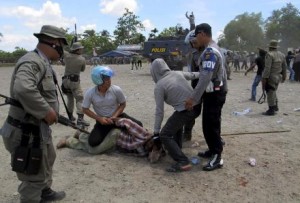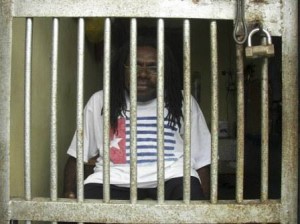SPREAD AWARENESS VISIT WWW.FREEWESTPAPAU.ORG
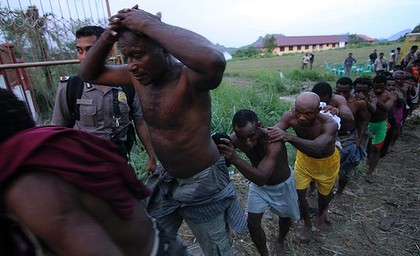
Human Rights
WARNING – the following article contains some disturbing images.
Ever since the invasion of West Papua over fifty years ago, the Indonesian security forces have committed a never ending catalogue of extreme human rights violations.
Over 500,000 civilians have been killed in a genocide against the indigenous population. Thousands more have been raped, tortured, imprisoned or ‘disappeared’ after being detained. Basic human rights such as freedom of speech are denied and Papuans live in a constant state of fear and intimidation.
Genocide
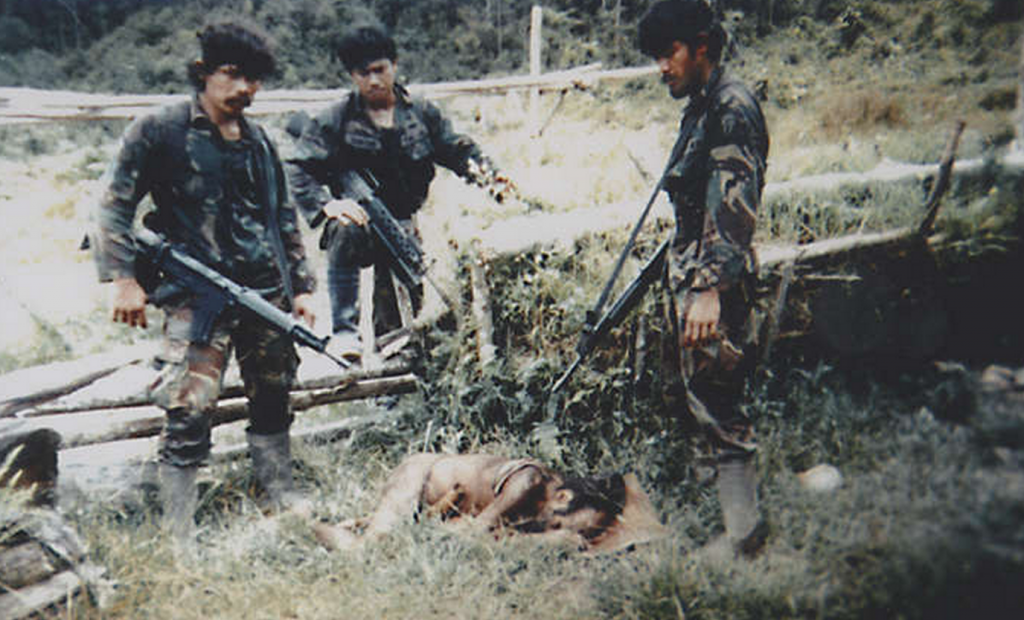
Almost all Papuans will be able to tell you stories of friends or family who have been murdered. A paper prepared by the Yale Law School for the Indonesian Human Rights Campaign in 2004 found “in the available evidence a strong indication that the Indonesian government has committed genocide against the West Papuans”.
A further study carried out by the University of Sydney claims that the continuation of current practices in West Papua “may pose serious threats to the survival of the indigenous people of the Indonesian province of Papua.”
Many towns and villages have witnessed wholesale massacres of their people. One such example was the ‘Biak Massacre‘ in 1998, where over 200 people including women and children were rounded up by the Indonesian military, loaded onto vessels, taken to sea and thrown overboard.
Torture
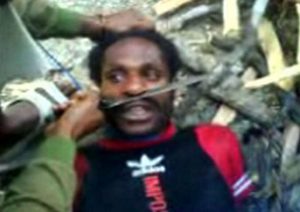
The use of torture by the Indonesian security forces against the indigenous Papuan population is widespread.
There is much documented evidence of this endemic behaviour and in recent years video footage (captured as ‘trophy footage’ by Indonesian soldiers) has been leaked and broadcast on international news channels such as Al Jazeera and Channel 4 News.
Rape
Sexual assault and rape has been repeatedly used as a weapon by the Indonesian military and police.
In a public report to the U.N. Commission on Human Rights in 1999, the Special Rapporteur on Violence Against Women concluded that the Indonesian security forces used rape “as an instrument of torture and intimidation” in West Papua, and “torture of women detained by the Indonesian security forces was widespread”.
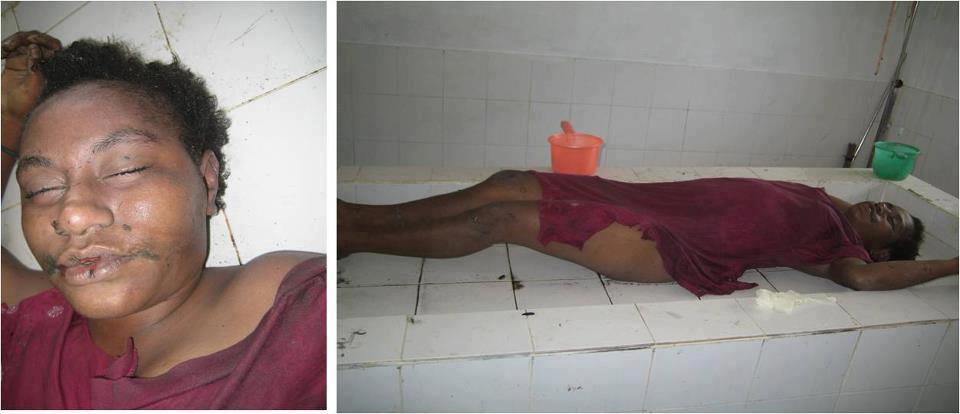
The Robert F. Kennedy Memorial Centre for Human Rights prepared a full report on “Rape and Other Human Rights Abuses by the Indonesian Military in Irian Jaya (West Papua), Indonesia”.
Freedom of Expression
The basic rights to freedom of expression are almost completely denied in West Papua. Anyone expressing any criticism of Indonesian rule and in particular aspirations for West Papuan independence can expect to be persecuted by the police and imprisoned.
Recently, leading human rights organizations KontraS Papua and the Commission for the Disappeared and the Victims of Violence, published a report on the increasing tendency of the Indonesian state to charge people peacefully expressing their desire for political independence with treason. They state:
‘In 2010, cases with a political dimension have characteristically become ensnared by the charge of makar, the Indonesian word for treason or rebellion… altogether in 2010, 32 people were charged or investigated in connection with Article 106 on makar.’
Political Prisoners
There are currently hundreds of West Papuan political prisoners being held in West Papua and across Indonesia. Many are serving long prison terms for peacefully protesting against Indonesian rule or for being members of organisations calling for West Papuan independence.
Filep Karma is a particular case in point, serving a 15 year jail sentence simply for raising the West Papuan national flag. He is an Amnesty International prisoner of conscience. Conditions in the prisons are often very poor and maltreatment of prisoners is common with many being beaten and tortured while detained. Prisoners have often developed severe health problems and been denied access to medical care.
Lives Lived in Fear
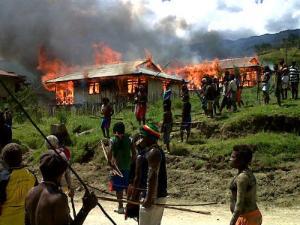
Many Papuans live in a constant state of fear and intimidation. People living in villages across West Papua can at any time be subject to military sweeping operations.
Under the pretence of looking for insurgents, the military have repeatedly swept through entire rural areas killing arbitrarily and burning whole villages to the ground, destroying subsistence food crops and livestock and forcing people to flee into the forests where they are prone to starvation and disease.
Impunity
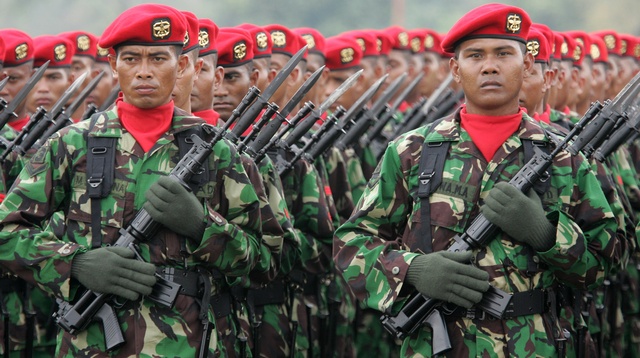
Despite public statements that the Indonesian government is improving its human rights record, the situation on the ground seems very different. There are often limited or no investigations into human rights abuses and if any discipline is handed out it is normally of little significance to the perpetrators of the abuses. Amnesty International states:
“Impunity for human rights violations is commonplace. Accountability mechanisms to deal with police abuse remain weak, and reports of torture by members of the security forces often go unchecked and unpunished. Many victims of past human rights violations in Papua are still awaiting justice.”
Access to Journalists and NGOs
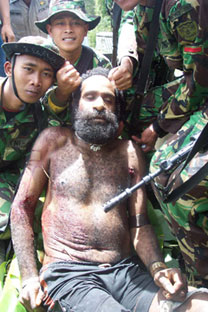
West Papua is currently off limits to international journalists. If discovered without permission they are arrested and deported by the Indonesian authorities. Some have even been attacked and imprisoned.
It is clear that Indonesian authorities will stop at nothing to keep the ongoing genocide they are directing in West Papua out of the international media agenda. West Papua has also become impossible to operate in for many NGOs. In 2010 the International Red Cross were expelled, and in 2012 Peace Brigades International were forced to leave. International human rights organisations such as Amnesty and Human Rights Watch are also denied access to West Papua.
Reports
The grave human rights situation in West Papua has been well documented by a number of leading NGOs who have compiled multiple damning reports:



